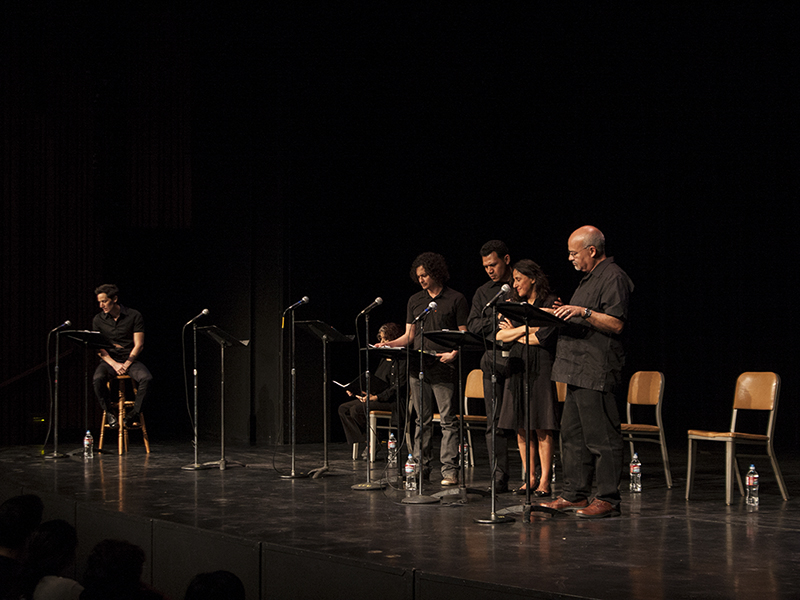
“Let’s meet at Rivera.” These are common words spoken by students at UCR, yet they may not often stop to think about the man whom the library was named after. Tomás Rivera, the youngest, first minority and Chicano chancellor, lives on through the legacy he left behind in his work and archives. The 25th Anniversary of the Tomás Rivera Conference was held on Friday, April 19 in HUB 302. Billed as “A Celebration of the Life and Work of Tomas Rivera,” it was an all-day event and was free and open to the public.
The day began with opening remarks by Tomás Rivera Endowed Chair Tiffany Ana Lopez. Lopez stated that the conference had been spearheaded by Concha Rivera, Tomás Rivera’s widow, and Carlos Cortes, to have a forum for conversations about pressing issues in the arts, administrative leadership, education and the humanities in general. She then introduced Chancellor Jane Close Conoley for the welcoming remarks.
Chancellor Conoley stated that Rivera was not only the first Latino chancellor in the UC system but he was the first in the country. She also believes, “It is important that we honor a man who typifies the challenges and the journey of so many at UCR. Chancellor Rivera is a shining example of what education can accomplish in an individual.” Chancellor Conoley reiterated Rivera’s civic morality and stated, “As Dr. Lopez said, the chancellor’s message of civic morality is the ideal we hope to instill in each student that passes through our doors here at UCR.”
Throughout the conference, the phrase “civic morality,” often used by Tomás Rivera, was constantly repeated. It referenced having a civic morality to use the resources we have at the university that create bridges between the university and the community.
Lopez then introduced the three panelists who have had careers of making art for over 25 years. The first panelist was Luis Alfaro, a playwright, community activist and professor of theater at USC. Alfaro is also a recipient of the MacArthur Fellowship. He grew up in Pico Union in downtown Los Angeles, which was the most violent and poorest neighborhood when he was a kid. Alfaro then proceeded to share his family story. He lived in a house with 16 people and every time there was a shooting, they would get down on the floor of the kitchen and hold hands in a circle. Alfaro stated he loved this because he felt so connected to his family during these times. He contributes this as the “connective tissue” that made him the artist he is because of the stories that got told on the floor of the kitchen. Alfaro recalled his father telling him that one of his jobs was to bring to light all of that that is in the dark after he wrote a story of shootings in his neighborhood and was suspended in the fourth grade.
He shared one of his pieces in which he asked the audience to sing the refrain of “Lovin’ You” by Minnie Riperton and soon the whole room was filled with “la la la la las.” His story was about his excitement over singer Minnie Riperton as a ninth grader and growing up in Pico Union. Alfaro also spoke of his mentors and how he evolved as a storyteller and activist. The notion of service and giving was embedded in him because he was brought up as Pentecostal and Catholic. He wanted to use art to create social change and does so by going around the country and living in communities that are disenfranchised. He educates himself on issues communities are facing and advocates for change. Alfaro believes to make great art you have to educate yourself and to him, theater is both spiritual and political.
The next panelist, Josefina Lopez is also a playwright, screenwriter, and founding Artistic Director of CASA 101. Lopez’ play “Detained in the Desert” was performed at UCR a few years ago. She grew up in Boyle Heights and was undocumented for thirteen years after coming to the states at the age of five. Her household was very “macho” and she grew up questioning why her brothers were treated better than her and decided to use her anger to make a change. Anger is what we sometimes call passion, Lopez stated. “If I hadn’t picked up the pen, I know I would have killed myself,” she said.
She wrote “Real Women Have Curves,” a play that portrayed Latinas working in Los Angeles sewing factories. Lopez decided to pay for her own production with her financial aid from UCLA which ran for thirteen weeks. It was seen by a producer and then the movie came about through HBO. She had wanted to be an actress but was constantly turned down because she wasn’t right for the “stereotypical” Latina roles. Deciding to write her own plays and screenplays in order to create a world she believes in where the Latina girls aren’t stick skinny was her way of creating change. She founded CASA 101 in Boyle Heights because she wanted to give back to her community with a theater that produces plays about Latinos year round. It started as a small theater but has grown to become a state of the art theater where people can give proper respect to their story. Lopez also teaches writer workshops because she believes everyone has a story to share.
The final panelist, Barbara Carrasco, is an artist, activist and founding member of the Dolores Huerta Foundation. She has produced a portrait series of Chicano leaders which now includes the portrait of Tomás Rivera that she drew freehand after researching his archives and speaking with his wife Concha Rivera. That portrait was used for the conference’s flyer and poster image. She worked with Cesar Chavez to create banners for the United Farm Workers. Another great accomplishment of hers is that the Girl Scouts Foundation will use her portrait of Dolores Huerta, a civil rights activist, as a patch for girls to earn after completing a project about Huerta. Carrasco believes art can be used to make social change.
Steven Mandeville-Gamble, the University Librarian shared his plan to make Tomás Rivera’s archives digital so that anyone around the world would be able to view them. It will require time but it will bring Rivera’s work back to life. Tiffany Ana Lopez, also appointed Lisette Lasater the first-ever Tomás Rivera Teaching Assistant which will begin in the fall later this year. Lasater holds a UC teaching certificate and is also a recipient of the Rivera Endowment Fellowship among her many accomplishments. She is a first generation college student and accepted her position expressing how much she loved teaching. “I tell my students at the start of every quarter that being there with them in that classroom is my dream.”
The first portion of the 25th Anniversary of the Tomás Rivera Conference concluded with a lunch and performance by Quetzal, Grammy Award-winning artists for their album “Imaginaries.” After lunch, guests who registered for workshops taught by the three panelists and other invited speakers, broke into their respective workshop classes. The all-day conference concluded with a reading of Rivera’s “And the Earth Did Not Devour Him,” a play that told the story a Latino family struggling with poverty and discrimination in South Texas.








